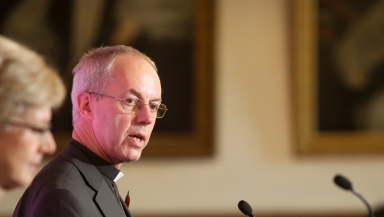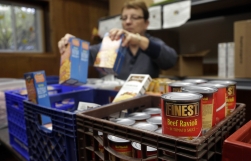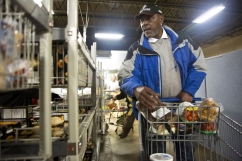
The Archbishop of Canterbury is heading for a row with the Government over calls for a £150 million State-funded system of food banks to help feed the poorest people in Britain.
Shocked by the suffering of those going hungry in the UK, Archbishop Justin Welby wants the Prime Minister, David Cameron, to accept European funds to support food banks and other measures to help those falling through the net as the austerity measures bite.
Writing in the Mail on Sunday, the Archbishop calls for more to be done to help hungry families.
Tomorrow, Archbishop Welby will launch a Parliamentary report that calls for a new public body, Feeding Britain, to be set up and for bigger food banks to distribute more free food and advise people on benefits and home budgets.
The inquiry, set up earlier this year with financial backing from the Archbishop's charitable trust, has taken evidence on the extent and causes of hunger in Britain, the scope of provision to alleviate it and draws comparisons with other Western countries.
It is headed jointly by Labour MP Frank Field and the Bishop of Truro, Tim Thornton, a passionate supporter of food banks. Archbishop Welby has been involved throughout and according to the Mail on Sunday, the report pays tribute to "the support he has given throughout our inquiry."
Writing in the newspaper, Archbishop Welby said food was being wasted at "astonishing" levels across the UK and that hunger stalks large parts of the country.
Families were being forced to turn to food banks to make ends meet even when they were in employment.
He admitted it was less serious but still said the plight of a family who turned to a food bank in Britain shocked him more than terrible suffering in Africa because it was so unexpected.
"In one corner of a refugee camp in the Democratic Republic of Congo was a large marquee. Inside were children, all ill. They had been separated from family, friends, those who looked after them. Perhaps, mostly having disabilities, they had been abandoned in the panic of the militia attack that drove them from their homes. Now they were hungry.
"It was deeply shocking but, tragically, expected. A few weeks later in England, I was talking to some people – a mum, dad and one child – in a food bank. They were ashamed to be there. The dad talked miserably. He said they had each been skipping a day's meals once a week in order to have more for the child, but then they needed new tyres for the car so they could get to work at night, and just could not make ends meet.
"So they had to come to a food bank. They were treated with respect, love even, by the volunteers from local churches. But they were hungry, and ashamed to be hungry. I found their plight more shocking. It was less serious, but it was here. And they weren't careless with what they had, they were just up against it. It shocked me that being up against it at the wrong time brought them to this stage. There are many like them. But we can do something about it."
Earlier this year the Government blocked millions of pounds of European funding agreed for British food banks, arguing that food aid was better decided nationally.
Archbishop Welby said: "We need to make it easier for food companies to give edible surplus food to charities and still encourage them to send inedible food for energy production. The big names in the food business have a moral obligation to communities. We need to make sure that the financial incentives in their industry don't act against their moral instincts."
A Cabinet Office spokesman said: "This report is a serious contribution to an important debate, and recognises that the reasons behind demands for emergency food assistance are complex and frequently overlapping. As a country we have enough food to go around, and we agree that it is wrong that anyone should go hungry at the same time as surplus food is going to waste.
"While this report outlines important areas for consideration, we should remember that this country has been through the deepest recession in living memory, and sticking to this government's long-term economic plan is the best way to improve living standards.
"In addition, the UK has a proud tradition of civil society and faith groups providing support for people in need, and it is right that their impressive work is recognised in the report. Under tough circumstances, communities have shown that by pulling together to help each other, we can build a bigger, stronger society."

















